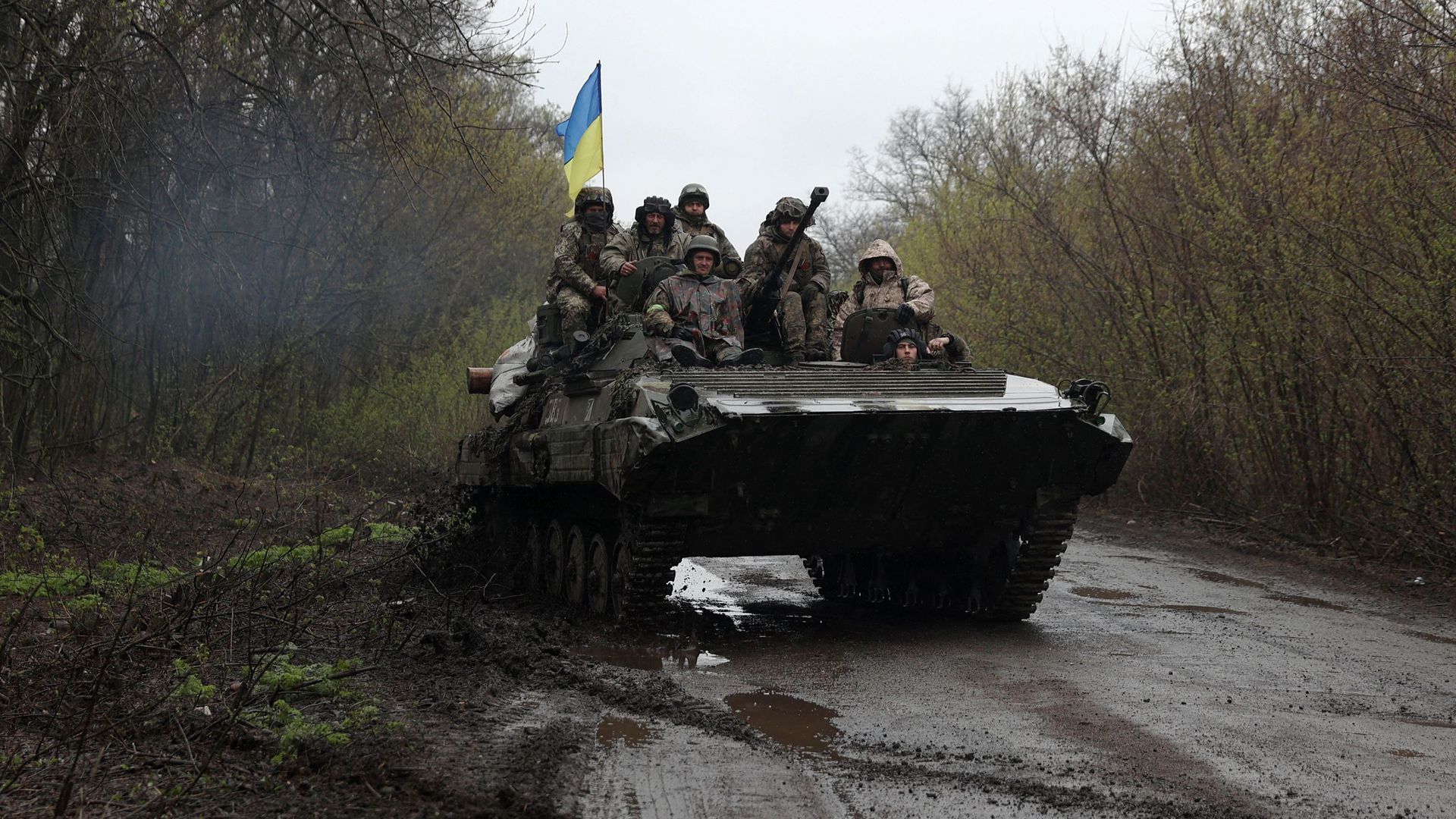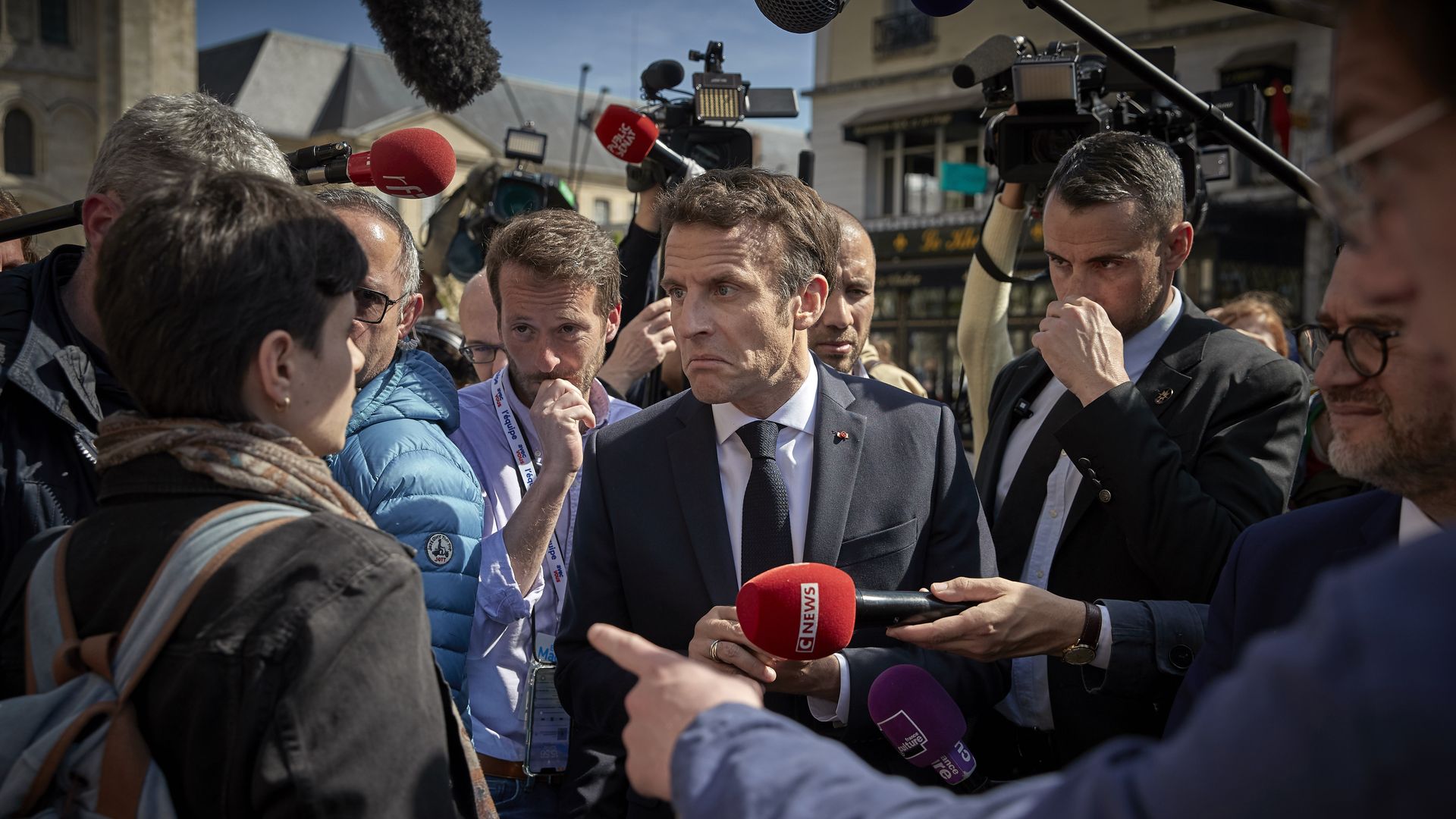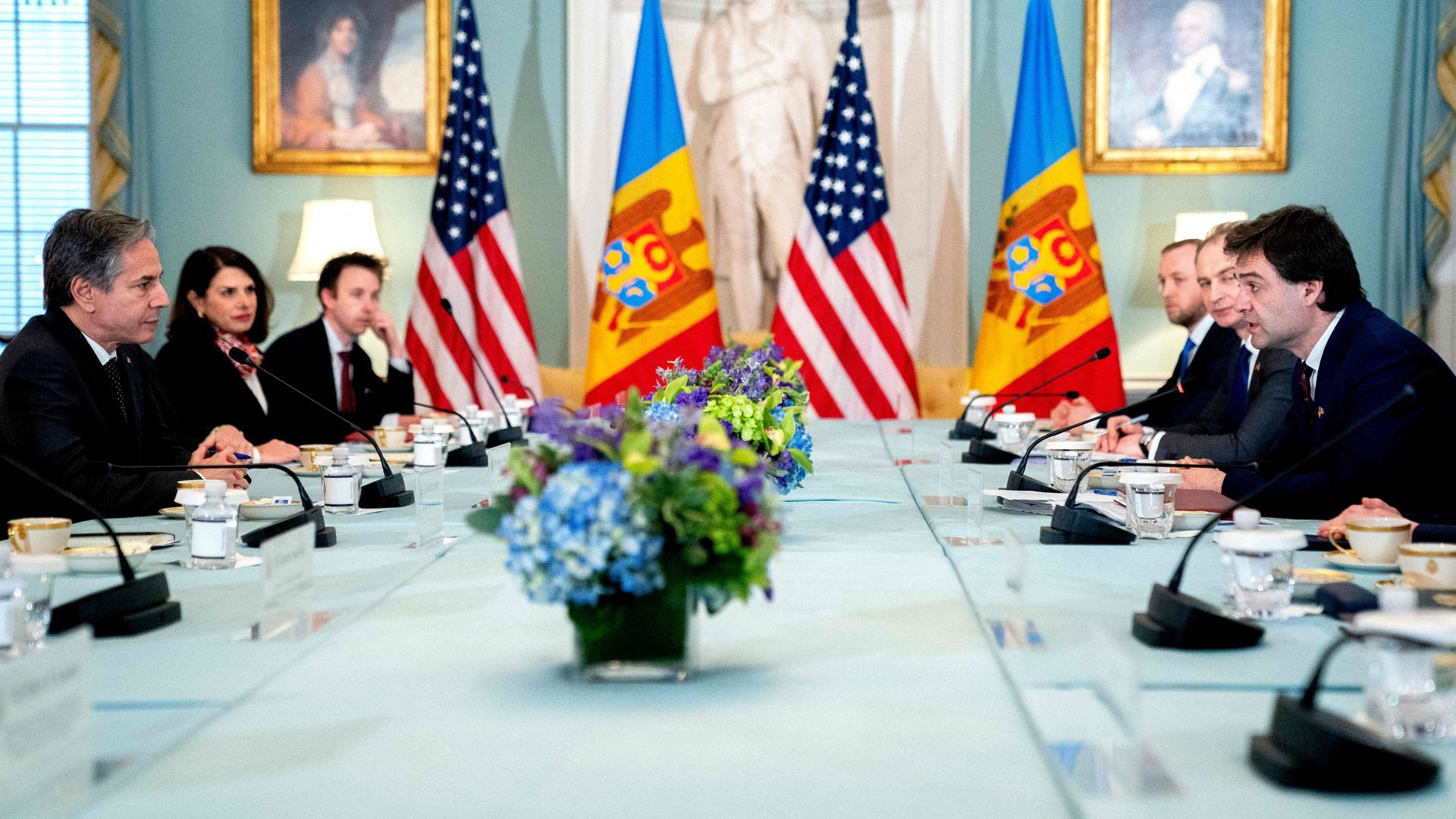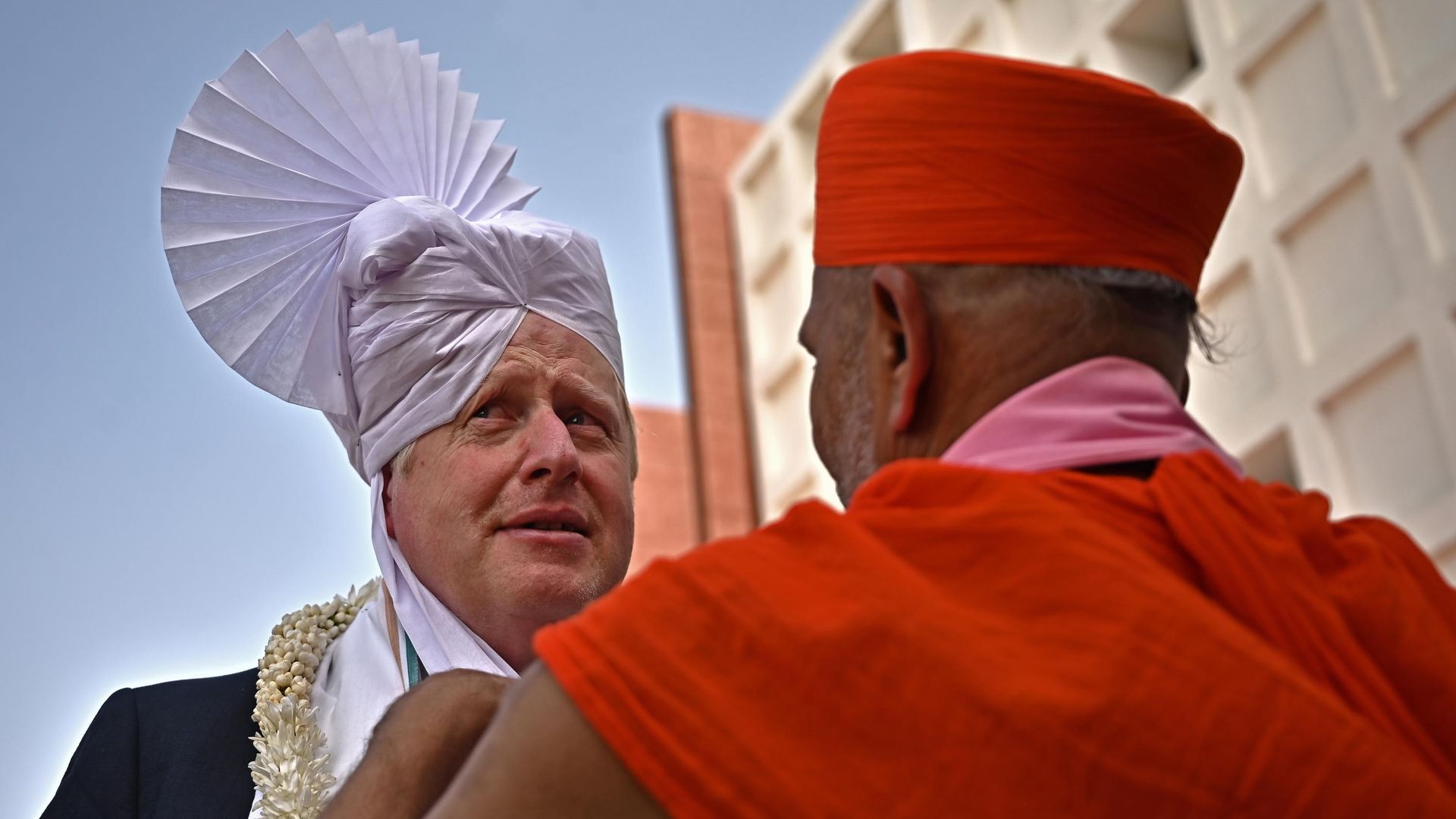| | | | | | | | | | | Axios World | | By Dave Lawler · Apr 21, 2022 | | Welcome back to Axios World. - Tonight's edition (2,042 words, 7½ minutes) has stops in Mariupol, Paris, Kinshasa, Santiago and more. Thanks as always for joining us.
- Heads-up: My colleagues Mike Allen and Ben Geman will host a virtual event tomorrow (12:30pm ET) on the U.S. climate agenda, with guests including White House climate adviser Gina McCarthy. Register here.
| | | | | | 1 big thing: Arms influx boosts Ukraine's hopes of victory |  | | | Ukrainian troops stand on an armored personnel carrier not far from the front line in the Kharkiv region. Photo: Anatolii Stepnov/AFP via Getty | | | | An inrush of howitzers, artillery shells and drones is heading to Ukraine in a new $800 million package announced today by President Biden. The Pentagon says Ukraine now has more functional tanks than Russia due to shipments from countries including the Czech Republic. The big picture: With a potentially decisive battle now underway in the eastern Donbas region, the urgency to get arms to the front lines is ramping up, and concerns about provoking Vladimir Putin are fading — at least in Washington. - Biden promised to continue sending arms "without interruption" and told Americans they should be proud that U.S. arms and intelligence were helping Ukraine "beat back Putin's savagery."
In contrast, German Chancellor Olaf Scholz is under pressure from Kyiv, EU allies and his own government for refusing to provide certain heavy weaponry, like tanks or other military vehicles. - Scholz defended his cautious approach this week in the Bundestag, saying Germany could not "go it alone" and had to consider its own defense needs and the risk of escalation beyond Ukraine's borders.
There's also a growing debate about what a realistic outcome in the Donbas might look like. - A European official briefed reporters Tuesday that the latest assessment is Russia will be able to take the remainder of Luhansk and "a bit" of Donetsk — the two provinces that comprise the Donbas region — as well as a very narrow land corridor to Crimea.
- At that point, within four to six months, there will be a stalemate and the potential for more serious negotiations, the official predicted.
- However, U.K. Prime Minister Boris Johnson told Parliament this week that he sees no path to a diplomatic solution with Putin, and thus "we must do everything we can to ensure he fails."
Some experts argue that, with enough Western support, Ukraine could actually defeat Russia, which the Pentagon says has lost 25% of its combat power in eight weeks of war. - "If we continue this path, accelerating deliveries with broader European production and contribution, in a few weeks Russia will be losing unambiguously," Eliot Cohen of The Johns Hopkins School of Advanced International Studies tweeted today. "Time to double down and aim for Ukrainian victory."
- A European Council of Foreign Relations analysis contends that if NATO countries commit to a lend-lease program for Ukraine — paired with intensive training for Ukrainian troops on advanced systems like F-15 fighter jets — Ukraine could gain the upper hand.
- If the war does drag on, Russia will be contending with dwindling stockpiles, and sanctions could impact future production of some weapons systems.
- Yes, but: It's not entirely clear what a military victory for Ukraine would look like, as outright surrender from Putin appears unlikely.
Driving the news: In a televised meeting today, Putin ordered Defense Minister Sergei Shoigu to cancel plans to raid the massive steel plant in Mariupol where Ukrainian troops and hundreds of civilians are holding out, and instead seal it off. - Putin effectively claimed control of the key port city, but he has rebuffed Ukrainian calls for a humanitarian corridor to allow the troops and civilians out.
- Maj. Serhiy Volyna, commander of Ukraine's 36th Separate Marine Brigade that's defending the plant, has refused to surrender but said Wednesday that, "We are probably facing our last days, if not hours."
Go deeper: Satellite images show mass grave in Ukrainian town near Mariupol |     | | | | | | 2. French election: Debate boosts Macron in home stretch |  | | | Macron campaigns in Saint-Denis, a suburb of Paris. Photo: Kiran Ridley/Getty Images | | | | French President Emmanuel Macron may be breathing a bit easier after last night's debate, his lone showdown with far-right challenger Marine Le Pen before Sunday's runoff. State of play: A large plurality found his performance "more convincing" according to Ipsos polling, which showed his lead growing to 15% (other pollsters show a 10%–12% advantage). - What to watch: Macron has a 2-to-1 edge over Le Pen among voters who backed far-left candidate Jean-Luc Mélenchon in the first round according to the Ipsos poll, but 48% say they don't support either candidate. That makes turnout a major question mark, particularly on the left.
- Between the lines: Le Pen entered the runoff down just 6% in some polls, but her failure to capitalize on the debate may put the race out of reach.
Debate highlights: The most explosive moment came when Macron said Le Pen's proposal to ban women from wearing the hijab in public could cause a "civil war" and would force French police to chase girls in hijabs or Jewish boys in yarmulkes down the street. - In another stinging attack line, Macron called Vladimir Putin Le Pen's banker and said she would have a "dependency" on Moscow because her party has yet to fully repay a 2014 loan from a Kremlin-linked bank. Le Pen shot back that she's a "completely free, independent woman."
Le Pen hit Macron hard in two areas: crime and the rising cost of living. - She denied that she planned to pull France out of the Euro or the EU — positions she has shifted on since 2017 — but said she would stand up for France in Brussels in a way no previous French president had.
Le Pen didn't lose her cool, as in her disastrous 2017 debate performance, and largely succeeded in projecting warmth and empathy through nearly three hours of debating, though she did grow flustered at times when Macron pressed her on specific numbers and policy positions. - Pundits noted that while Macron's didactic tendency underscored his mastery of the policy issues, it may have turned off voters already inclined to view him as arrogant.
- When Macron quipped at one point that Le Pen had been "much better behaved than last time," she replied smilingly, "We're getting older and wiser."
Full highlights. |     | | | | | | 3. View from Kinshasa: Playing catch-up on vaccinations |  | | | Carrying doses in Goma, DRC. Photo: Guerchom Ndebo/Getty Images | | | | No big country has struggled to roll out vaccines more than Democratic Republic of Congo, where less than 1% of the population is fully vaccinated. State of play: Vaccines still aren't available in some remote provinces of the central African giant, but rates are very low even in the capital Kinshasa, home to 17 million. - Seth Berkley, CEO of the Gavi vaccine alliance and point person for the global COVAX initiative, recently told Axios that supply was no longer an issue. COVAX is prepared to send more doses to DRC, he said, if and when the existing supply is rolled out.
On the ground: "When we started in November, there was not much interest" in getting vaccinated, says Freddy Nkosi, DRC director for VillageReach, an NGO that works on health care delivery in low-income countries. - VillageReach operates four vaccination centers in Kinshasa, which Nkosi says are conveniently located near bus stops or markets, and they're open seven days a week with no appointment necessary. They are offering five different vaccines: Pfizer, Moderna, J&J, AstraZeneca and Sinovac.
- Nkosi says demand has been increasing over the past two to three months as people grow "more and more confident."
- He says "rumors" — that vaccines had killed people or contained ingredients that would violate religious practices — have been the biggest obstacle. Nkosi thinks some of that misinformation was imported from the West via social media, while some are specific to the DRC.
Between the lines: Asked why the rate in DRC is so much lower than other low-income countries with similar challenges, Nkosi was uncertain, though he noted that a strike among health care workers didn't help. - Somewhat surprisingly, the uptick in vaccination is coming as fear of COVID fades and life largely returns to normal, Nkosi says.
- Many people decided to come in after someone they knew was vaccinated. Others need vaccines for work or travel.
The bottom line: "We are hoping to turn the tide," Nkosi says. "We started at a snail's pace, but I do have hope we can still catch up." |     | | | | | | A message from Axios | | 5 comms strategies for stronger workplace culture | | |  | | | | We went on a search to understand how innovative organizations are rethinking communications. This report pulls together insight from execs around the world to explain the strategies they've used to level up workplace communications. Get the report | | | | | | Bonus: Where in the world? | | Tonight we're asking a simple question: NATO or no? I give you a country, you tell me whether they're in NATO. - Germany
- Ireland
- Canada
- Mexico
- Greece
- Turkey
- Serbia
- Kosovo
- Hungary
- Romania
- Moldova
- Albania
- Sweden
- Norway
- Finland
- North Macedonia
Scroll to the bottom for the answers. |     | | | | | | 4. Global news roundup | | 1. Former Honduran President Juan Orlando Hernández was extradited to the U.S. today to face drug trafficking and weapons charges, 2. Approval for Chilean President Gabriel Boric, a young and charismatic progressive who took office last month, has already plummeted to 28%, according to one recent poll. - That's partially due to economic factors outside his control but, "with only one or two exceptions, his ministers are first-timers, and it shows," Robert Funk of the University of Chile writes in Americas Quarterly.
3. In Peru, Chinese firm MMG is pausing operations at one of the world's largest copper mines due to protests from locals who were relocated 11 years ago to allow the mine to open. They say the company isn't making promised financial contributions. 4. Top Western officials walked out of a G20 gathering yesterday when Russia's finance minister began to speak. 5. Less than two months after Russia's invasion, a steady stream of Western diplomats are returning to Kyiv to reopen embassies and facilitate in-person visits by their national leaders, Axios' Zach Basu reports.  Data: Axios research; Note: The Polish Embassy never closed and Kyiv rejected the offer of a visit by German leadership; Table: Kavya Beheraj/Axios 6. Ethiopians are lining up to join the war on Russia's side due to claims on social media that they will receive $2,000 to join, Reuters reports. It's unclear whether any will actually travel to Ukraine. |     | | | | | | 5. Ukraine's "most fragile" neighbor welcomes Western wake-up call |  | | | Secretary of State Antony Blinken (left) hosts Moldovan Foreign Minister Nicu Popescu on Monday. Photo: Stefani Reynolds/Pool/AFP via Getty Images | | | | The war in Ukraine has awakened the U.S. and EU to the reality that engagement with former Soviet and Eastern bloc states can't continue at the "snail's speed" of the past three decades, Moldova Foreign Minister Nicu Popescu tells Zach. State of play: Moldova, a tiny landlocked country wedged between Ukraine and Romania, has taken in 100,000 Ukrainian refugees, equivalent to 3.5% of its population. - That affects "every single little piece of the functioning of Moldova's state and society," Popescu says.
- European foreign ministers are flocking to the capital city of Chișinău to show solidarity. Earlier this month, Moldova received an EU membership questionnaire Popescu hailed as a "game-changer."
- Moldova has been led by pro-EU President Maia Sandu since December 2020, but pro-Russian parties and media retain considerable influence in the former Soviet republic.
Russian troops occupy Transnistria, an unrecognized breakaway state internationally recognized as part of Moldova. Moldova is also 100% reliant on Russian gas. - Those additional factors help make Moldova the "single-most fragile neighbor of Ukraine," Popescu said.
The bottom line: The war and resulting refugee crisis have put great strains on Moldova and forced the government to delicately balance its solidarity with Ukraine and its reliance on Russia. - But they've also turned Moldova's EU ambitions into a "shared endeavor," which Popescu stressed is "a really big deal."
Read the full piece. |     | | | | | | 6. One to watch: China's sputtering economy |  Data: FactSet; Chart: Baidi Wang/Axios China, the largest single driver of global economic growth, is stalling as its "zero COVID" policy translates into large-scale lockdowns, Axios' Matt Phillips and Bethany Allen-Ebrahimian write. Why it matters: The path of the world economy and global financial markets this year largely hinges on China's economic and public health. Driving the news: The International Monetary Fund reduced China's growth projection to 4.4% this year, well below Beijing's goal of 5.5%. - The IMF also slashed its overall global growth projection by 0.8 percentage points to 3.6% and significantly raised its inflation forecast, particularly in developing countries.
- That global forecast is premised on the idea that war won't spread beyond Ukraine, further sanctions will exempt the Russian energy sector, and the pandemic will continue to fade — none of which is a sure thing, Axios' Neil Irwin reports.
|     | | | | | | 7. Stories we're watching |  | | | Boris Johnson today in Gujarat, India. Photo: WPA Pool/Getty Images | | | - Canada bans foreign homebuyers
- Lebanon crisis' "grave consequences" for children's health
- Blasts targeting Kabul school kill at least 6
- Russia says it test-fired nuclear-capable missile
- Defense Sec. Austin speaks with Chinese counterpart for first time
- Wimbledon bans Russian, Belarusian players
- U.S. officials make emergency trip over Jerusalem tension
Quoted: "We think we are fighting fascism, but there isn't fascism there." — Sergei Klokov, a driver at Moscow's police headquarters, to a friend. Unbeknownst to him, his phones had been tapped. He's now in jail, WSJ reports. "He said that we did not have a right to attack and go to war with them, and while I tried to explain to him that there is no war, he didn't listen to me. I can't explain why he became so radical." — One of Klokov's colleagues, to police |     | | | | | | A message from Axios | | 5 comms strategies for stronger workplace culture | | |  | | | | We went on a search to understand how innovative organizations are rethinking communications. This report pulls together insight from execs around the world to explain the strategies they've used to level up workplace communications. Get the report | | | | Answers: 1. Germany (Y); 2. Ireland (N); 3. Canada (Y); 4. Mexico (N); 5. Greece (Y); 6. Turkey (Y); 7. Serbia (N); 8. Kosovo (N); 9. Hungary (Y); 10. Romania (Y); 11. Moldova (N); 12. Albania (Y); 13. Sweden (N); 14. Norway (Y); 15. Finland (N); 16. North Macedonia (Y). |  | It's called Smart Brevity®. Over 200 orgs use it — in a tool called Axios HQ — to drive productivity with clearer workplace communications. | | | | | | Axios thanks our partners for supporting our newsletters. If you're interested in advertising, learn more here.
Sponsorship has no influence on editorial content. Axios, 3100 Clarendon Blvd, Suite 1300, Arlington VA 22201 | | | You received this email because you signed up for newsletters from Axios.
Change your preferences or unsubscribe here. | | | Was this email forwarded to you?
Sign up now to get Axios in your inbox. | | | | Follow Axios on social media:    | | | | | |











No comments:
Post a Comment